Published in Nacional number 623, 2007-10-23
NACIONAL REVEALS
Loncar gets Croatia into the Security Council
LOBBYIST AND ADVISOR TO PRESIDENT Stjepan Mesic, diplomat Budimir Loncar, played the key role in Croatia\'s election to the Security Council of the United Nations
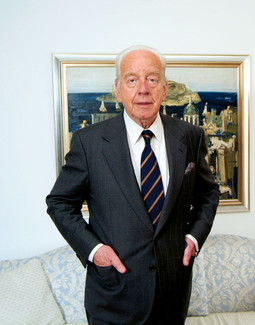 SPECIAL ADVISOR Budimir Loncar advises President Stjepan Mesic on foreign affairsBudimir Loncar, advisor to President Mesic, is the key diplomacy lobbyist and person who got Croatia into the Security Council of the United Nations. With Mesic's support, Loncar, travelling over the past 15 months or so from Pakistan and Ghana to New York, had over one hundred meetings with leading representatives of the Third World. The culmination was last week in New York when Croatia beat the Czech Republic and became a non-permanent member of the Security Council with a two-year mandate, with the entire operation carried out and coordinated by the last head of the Yugoslav diplomacy, now serving as a special foreign policy advisor to Stjepan Mesic.
SPECIAL ADVISOR Budimir Loncar advises President Stjepan Mesic on foreign affairsBudimir Loncar, advisor to President Mesic, is the key diplomacy lobbyist and person who got Croatia into the Security Council of the United Nations. With Mesic's support, Loncar, travelling over the past 15 months or so from Pakistan and Ghana to New York, had over one hundred meetings with leading representatives of the Third World. The culmination was last week in New York when Croatia beat the Czech Republic and became a non-permanent member of the Security Council with a two-year mandate, with the entire operation carried out and coordinated by the last head of the Yugoslav diplomacy, now serving as a special foreign policy advisor to Stjepan Mesic.
And while in the public eye the impression had been created that Ivo Sanader deserved most of the credit for the acceptance of Croatia to the Security Council, the truth is somewhat different. The Government and Sanader followed Mesic's activities in which he endeavoured to win over the support of other countries without any particular interest, and Loncar acted exclusively following instructions from Pantovcak. In a little over a year he managed, thanks to connections in the diplomacy, to win over the non-aligned nations and the Islamic and African states, and with their support achieve the greatest foreign policy success of independent Croatia.
The man who initiated the idea of a Croatian bid for a seat on the Security Council was Ivan Simonovic, the former Ambassador to the UN. The day after the reintegration of the Croatian Danube River region had been completed in January of 1999, Simonovic presented the idea of a candidature to Mate Granic, and the then head of the diplomacy had supported him. But that was where it ended because Tudjman's regime led Croatia into international isolation and there was no chance of success in the late 1990s. The situation improved somewhat when Racan and Mesic came to power, but the possibilities were still slim and the new government - just like Sanader's - feared a diplomatic debacle.
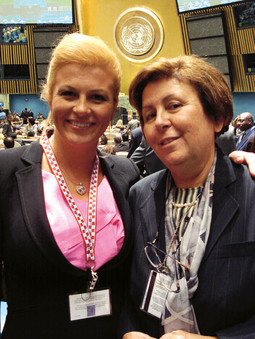 KOLINDA GRABAR-KITAROVIC and Mirjana Mladineo in New York on 16 OctoberCroatia could have made the bid, but without good preparation and a long term lobbying effort it might have gotten the support of 30 countries and left a comic impression. That is why the idea of membership was put on "stand by" for several years, until the summer of 2006 when Mesic went into action and engaged Loncar to spearhead the effort.
KOLINDA GRABAR-KITAROVIC and Mirjana Mladineo in New York on 16 OctoberCroatia could have made the bid, but without good preparation and a long term lobbying effort it might have gotten the support of 30 countries and left a comic impression. That is why the idea of membership was put on "stand by" for several years, until the summer of 2006 when Mesic went into action and engaged Loncar to spearhead the effort.
In the middle of last year Mesic travelled to Havana to participate in the Summit of the non-aligned nations. At least two things put the Croatian delegation in Cuba in a special position: first, Mesic is the only president of a country to appear in the role of an observer in the history of the non-aligned movement, and second, Loncar is along with Fidel Castro the only living participant of the meeting in 1960 where the decision was made to found the Non-aligned Movement. As a young diplomat he was witness to a meeting held 47 years ago where the idea of the non-aligned movement was born, which was launched by five statesmen of the time - Tito, Nasser, Nehru, Nkrumah and Sukharno.
Mesic's departure to the non-aligned Summit had several motives. The chief were economic, because these were countries in which Yugoslav, and thereby Croatian, companies participated in large-scale investments for years. An additional motive was to get the stigma off Croatia as the destroyer of the one-time federation and to repair relations with individual countries. And finally, Mesic recognised the numbers, and thereby the strength of the countries of the Third World as a voting machine working in Croatia's favour. They needed now to be convinced to support Zagreb and that job was given to Loncar.
The choice was logical as Loncar has been in the diplomacy for over sixty years and there is no significant global political figure in the post war period he did not know. He was also the last foreign affairs minister of Socialist Yugoslavia, and subsequently the assistant to the UN Secretary General for relations with the Non-aligned Movement. Of no less importance are his acquaintances with the current leaders of political groups. He is, for example, a friend of Amir Mousso, Secretary General of the Arab League.
After the return from Cuba the former head of the Yugoslav diplomacy lobbied for Croatia's acceptance to the Security Council during three exceptionally important tours. First he travelled to Islamabad to a summit meeting of the Organisation of Islamic Nations which pools 54 Muslim states. Contacts were made at the Pakistani capital with the most important statesmen of the Islamic world, many of which promised to support the Croatian bid.
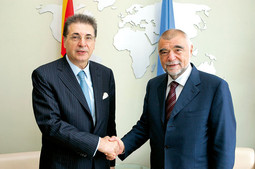 SRDJAN KERIM in New York with Stjepan Mesic; this Macedonian diplomat and former assistant to Budimir Loncar is now President of the UN General Assembly and one of the most influential people in the United NationsThe next step was a trip to a summit of the African Union in Accra. The African Union is the successor to the Organisation of African Unity and gathers 58 states. If one takes into consideration that some countries are members of both the African Union and the Organisation of Islamic Nations, these two organisations together pool some 80 countries or 40 percent of the members of the United Nations General Assembly. In Islamabad and at Accra, Loncar met with the representatives of most of these countries and convinced them that Croatia would defend their interests too in the Security Council.
SRDJAN KERIM in New York with Stjepan Mesic; this Macedonian diplomat and former assistant to Budimir Loncar is now President of the UN General Assembly and one of the most influential people in the United NationsThe next step was a trip to a summit of the African Union in Accra. The African Union is the successor to the Organisation of African Unity and gathers 58 states. If one takes into consideration that some countries are members of both the African Union and the Organisation of Islamic Nations, these two organisations together pool some 80 countries or 40 percent of the members of the United Nations General Assembly. In Islamabad and at Accra, Loncar met with the representatives of most of these countries and convinced them that Croatia would defend their interests too in the Security Council.
The situation was not easy as the Czechs also lobbied hard. The economy of the Czech Republic of stronger than that of Croatia, and their companies and products are significantly better represented in Asian and African countries, which is also an advantage. The level of diplomatic representation should also not be disregarded, as the Czech Republic has over a hundred embassies around the world, while Croatia has forty-five. That is why the Czechs were sure of their triumph, the proof of which is the arrival in New York of their Prime Minister Miroslav Topolanek.
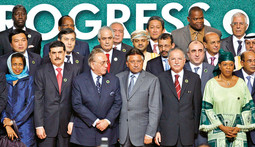 AT THE ANNUAL SESSION of the Foreign Ministers of the Organization of the Islamic Conference, Budimir Loncar lobbied for the votes of the 54 member statesThe final part of the job was done by Loncar in New York. He travelled to America with Mesic, who took part in the work of the UN General Assembly, and continued to lobby in diplomatic circles right up to the vote on membership in the Security Council. It was Loncar's 36th autumn session in New York and he is one of the diplomats with the longest career in the global organisation. The numerous contacts he has made over the past decades he used now to help Croatia get into the Security Council. During those days Loncar held some thirty bilateral meeting and coordinated the work of Croatian diplomats in the Croatian mission to the United Nations. Several days before the vote it was known which countries supported the Czechs and which ones supported Croatia. The Czech Republic's strongest allies were the USA, Germany and France, but no one resolutely opposed a possible Croatian victory. The German vote is interesting, explained to our diplomats by the German ambassador to the UN: "For historical reasons we can never vote against France, Poland, the Czech Republic and Austria."
AT THE ANNUAL SESSION of the Foreign Ministers of the Organization of the Islamic Conference, Budimir Loncar lobbied for the votes of the 54 member statesThe final part of the job was done by Loncar in New York. He travelled to America with Mesic, who took part in the work of the UN General Assembly, and continued to lobby in diplomatic circles right up to the vote on membership in the Security Council. It was Loncar's 36th autumn session in New York and he is one of the diplomats with the longest career in the global organisation. The numerous contacts he has made over the past decades he used now to help Croatia get into the Security Council. During those days Loncar held some thirty bilateral meeting and coordinated the work of Croatian diplomats in the Croatian mission to the United Nations. Several days before the vote it was known which countries supported the Czechs and which ones supported Croatia. The Czech Republic's strongest allies were the USA, Germany and France, but no one resolutely opposed a possible Croatian victory. The German vote is interesting, explained to our diplomats by the German ambassador to the UN: "For historical reasons we can never vote against France, Poland, the Czech Republic and Austria."
On the other hand, Loncar found equally powerful allies. Croatia was from the very start supported by exceptionally important countries, among which there are three permanent members of the Security Council - Britain, China and Russia, but also Italy, Austria, Romania, Hungary, Albania, Greece, Serbia, Macedonia and Bosnia & Herzegovina. The votes of the countries of the Balkans and the neighbourhood are especially important because their support confirmed that Croatia is seen in southeastern Europe as a stabile democracy that does not threaten anyone's vital interests.
In terms of strategy, Loncar knew that the first round of voting was crucial, and that at least a few votes had to be won more than by the Czech candidature. The idea was based on the promises that representatives of the Third World had given over the previous months that they too would, if Croatia was in the lead, vote for her in the second round. That the promise was sincere was confirmed in the second round of voting when a part of these votes shifted to Croatia, and the final proof came after the Czech Republic withdrew its candidature. 184 of 187 countries then voted for Croatia.
The success was clouded by the evident discord that has existed the entire time in the relations between the Office of the President and Government. To put it as mildly as possible, there are complaints directed towards Sanader and his team that boil down to the fact that Government was not interested in the accession of Croatia to the Security Council right up to near the end of the process. This information was confirmed for Nacional by several diplomats close to the Office of the President.
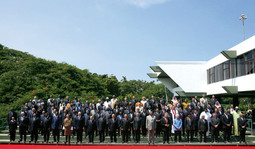 SUMMIT OF THE NON-ALIGNED NATIONS launched an initiative to vote for Croatia to enter the Security Council"I think that in this case it was not just a fear of defeat, but of something more important. The thing is that we could only get the votes of the Third World by re-evaluating some of the positive values that the former Yugoslavia once symbolised, and that is the policy of non-alignment, economic cooperation with less developed countries and a policy that demonstrated respect of the small, and not only of the most powerful in the world. Do not forget that Tito's Yugoslavia was a member of the UN Security Council as many as four times, something that no other country has succeeded in doing. A reminder of these facts and pointing out that Croatia was once of the successors of the former state was clearly something that the HDZ Government was not prepared to do", explained a diplomat close to Mesic.
SUMMIT OF THE NON-ALIGNED NATIONS launched an initiative to vote for Croatia to enter the Security Council"I think that in this case it was not just a fear of defeat, but of something more important. The thing is that we could only get the votes of the Third World by re-evaluating some of the positive values that the former Yugoslavia once symbolised, and that is the policy of non-alignment, economic cooperation with less developed countries and a policy that demonstrated respect of the small, and not only of the most powerful in the world. Do not forget that Tito's Yugoslavia was a member of the UN Security Council as many as four times, something that no other country has succeeded in doing. A reminder of these facts and pointing out that Croatia was once of the successors of the former state was clearly something that the HDZ Government was not prepared to do", explained a diplomat close to Mesic.
He claims that Sanader was a burden, which was particularly evident when the Prime Minister came to New York following the scandalous Hague verdicts on Mrksic, Sljivancanin and Radic. The original text of Sanader's speech before the delegates was changed just before he appeared at the podium of the United Nations. Thanks to a significant toning down of the rhetoric of the speech, Croatia managed to also get the support of Serbia for membership in the Council, and thereby a few more votes of countries that Belgrade could influence. Here again Loncar's role was crucial, as he has good relations with the Serbian diplomats at the UN.
A further point of conflict between the President's team and that of the Prime Minister concerns Mirjana Mladineo, the head of the Croatian mission. Sanader in 2005 tried to send Miomir Zuzul to New York, who abdicated from the position of foreign affairs minister in the wake of a corruption affair, which was opposed by Mesic who succeeded in getting Mirjana Mladineo appointed to the position. She lacks the political clout needed to represent Croatia in the Security Council, but at the President's Office they feel that the problem can be overcome by a firm coordination between themselves, the foreign affairs ministry and Government. Nacional's sources explicitly reject the idea that Kolinda Grabar-Kitarovic be sent to New York, saying that she too lacks the capabilities for the function.
Find an argument or some detail from her career to date why she could represent Croatia. There is no such argument", says Nacional's source.
Instead of that a bolstering of the personnel at the Croatian mission is proposed, all the more since the mandate of Mirjana Mladineo will be over in a year's time. Given that not even the SDP has an overly positive opinion of her, it is almost certain the by the summer of 2008 at the latest, Croatia will be represented in the Security Council by another diplomat.
The only issue on which there is agreement between Pantovcak and St. Mark's Square is the policy of Croatia as a non-permanent member of the Security Council. There is no doubt whatsoever that the international position is significantly better than it was a few months ago, and a seat of the Security Council additionally improves, for example, Croatia's negotiating situation with the European Union. Within 24 hours of the victory over the Czechs the Croatian delegation was visited by the Americans and representatives of a few other large countries and they were proposed what is in diplomatic circles known as "an intensification of relations."
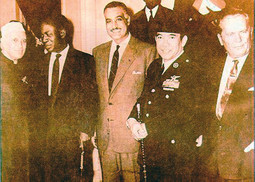 ESTABLISHMENT OF THE NON-ALIGNED MOVEMENT 1960. Nehru, Nkrumah, Naser, Sukarno and Tito; Loncar and Fidel Castro are the only living members of that meetingOver the coming year several decisions of significant global importance are to be adopted in the Security Council, the most important of which are the issues of the position towards Iran and that country's nuclear program and the proclamation of independence by Kosovo. Both issues have caused strong division in the international community, and in the case of Iran there is the danger of a new war with consequences that are still difficult to gauge. When it comes to Kosovo, Croatia is especially interested as it is a regional problem and one of relations with Serbia.
ESTABLISHMENT OF THE NON-ALIGNED MOVEMENT 1960. Nehru, Nkrumah, Naser, Sukarno and Tito; Loncar and Fidel Castro are the only living members of that meetingOver the coming year several decisions of significant global importance are to be adopted in the Security Council, the most important of which are the issues of the position towards Iran and that country's nuclear program and the proclamation of independence by Kosovo. Both issues have caused strong division in the international community, and in the case of Iran there is the danger of a new war with consequences that are still difficult to gauge. When it comes to Kosovo, Croatia is especially interested as it is a regional problem and one of relations with Serbia.
According to several high-ranking sources in Government and the Office of the President, Croatia will in these cases follow the position of the European Union. On this point there is agreement between Mesic, Sanader and the lion's share of the political elite.
HDZ not interested
Almost up to the start of voting the HDZ Government followed the activities of Mesic's representatives without much interest. For over a year it all boiled down to meetings the President had with foreign leaders and Loncar's lobbying tours. During the period Sanader dedicated his efforts entirely to the European Union and ignored any kind of lobbying on other continents while Kolinda Grabar-Kitarovic was even more inactive than her boss. It all came down to the President's Office, with the Croatian mission to the UN coming on board in the last few months, led by Mirjana Mladineo.
The role of Kerim
A significant role was played by Srdjan Kerim, the President of the General Assembly of the United Nations. Kerim was once Loncar's assistant and they are still in excellent relations, so that this diplomat too worked in Croatia's favour. Kerim organised a lunch at which, along with Loncar, diplomats were invited who represent a large number of countries - the Cuban ambassador who presides over the non-aligned movement, the ambassador of Qatar on behalf of the Arab League, a Pakistani representative of the Islamic states and an envoy of Singapore representing the members of ASEAN and the so-called small states. All in all the presiding parties of groups that pool more than half of the UN came.
Six decades in the diplomacy
Budimir Loncar was born in 1925 on the island of Ugljan. As a 17-year-old he joined the Partisans and went on later to work in the intelligence services. In 1949 he enters the diplomacy and becomes a consul in New York. He served as ambassador to Indonesia, Malaysia, Singapore and West Germany. From 1979 to 1983 he served as ambassador to the USA, and then went on to lead the diplomatic-intelligence service in Belgrade and in 1988 was appointed to the post of Minister of Foreign Affairs. He remained at the helm of the diplomacy up to the end of 1991. And although Loncar was in Croatia accused of opposing the breakdown of Yugoslavia, he was by 1992 given a diplomatic passport by Franjo Tudjman. In the later 1990s Loncar appeared in Croatia with increasing frequency and he was then also visited by Mesic. Mesic later defended him from criticism and in his second mandate named him hi diplomatic advisor.
Related articles
Omisalj to be the chief oil exchange in the Mediterranean
The Croatian port of Omisalj could soon become the hub of the oil trade in the western Mediterranean, and the chief partner to the Croatian firm… Više
Latest news
-
28.10.2010. / 14:15
'A profitable INA is in everyone's interest'
-
28.10.2010. / 09:38
Sanader’s eight fear SDP — Won’t bring down Government
-
21.10.2010. / 15:02
Interior Ministry turned a blind eye on Pukanic assassination
-
20.10.2010. / 09:34
Barisic could bankrupt HDZ




